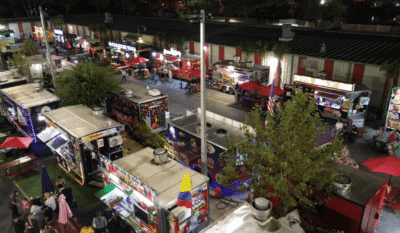This guide breaks down the key differences between food trucks and restaurants
Ever dreamed of launching your own food business but torn between going mobile or planting roots? You’re not alone! The culinary landscape offers exciting avenues, and for aspiring entrepreneurs, the choice between a food truck and a traditional restaurant is a pivotal one. Food truck vs. restaurant — both have unique perks and challenges, each catering to different aspirations and circumstances. Stay tuned as we unpack everything from location freedom to licensing hurdles, all designed to guide you toward the food business that truly aligns with your goals!

Startup costs: Mobility vs. brick-and-mortar
Food Truck: A food truck typically requires a lower initial investment. You’ll need to buy a truck, equip it with the necessary kitchen tools, and pay for the required permits. The cost of a food truck can range anywhere from $50,000 to $200,000, depending on the size, how customized the vehicle is, and what region you’re operating in.
You also need to decide if your truck will be parked at a food truck park or will be moving around locations.
Restaurant: Opening a restaurant, on the other hand, involves significantly higher upfront costs and long-term commitment. These include securing a lease, renovating the space, purchasing furniture, kitchen equipment, and navigating utilities like power, water, internet, etc. The average cost of opening a restaurant can range from $250,000 to over $500,000, depending on location, concept, and size.

Operating costs and overhead
The daily operating costs of a business are vital to its profitability.
Food Truck: Food trucks usually have lower operating costs. There’s a much lower cost and commitment when it comes to where your food truck will live and operate, and you’ll typically only need a small staff team. However, there are still costs to consider—gas, truck maintenance, insurance, and purchasing supplies regularly. Food trucks can be more reliant on seasonal income and weather. The beauty of having a food truck in Orlando and Kissimmee, Florida, is that we have sunshine all year.
Restaurant: Operating a restaurant comes with higher overheads. You’ll need to pay rent, utilities, and maintain a larger team of cooks, servers, and managers. Additionally, restaurant operations can be relatively fixed. There’s less flexibility in adjusting costs unless you make significant operational changes.

Licenses, regulations, and red tape
Before you start any food business, it’s important to consider licensing and regulations.
Food Truck: Food truck owners must navigate a patchwork of local, state, and national regulations. These include health permits, parking permits, and specific licensing for mobile businesses. Depending on your location, the regulations can vary, and you may need to follow different rules when you move from city to city.
For a detailed guide on food truck permits and regulations, check out this resource from Webstaurant Store.
Restaurant: Opening a restaurant also requires various permits (health inspections, alcohol licenses, etc.), but these are more standardized compared to food trucks. The restaurant industry has more established processes, and many of the laws and regulations are the same from location to location—though zoning and liquor licenses can still present hurdles.

Lifestyle fit and time commitment
How much time do you want to spend working each day?
Food Truck: Operating a food truck is a physical and demanding job. You’ll likely be working long hours, setting up and breaking down at events, and handling day-to-day operations. As the food truck owner, you can manage the business independently or with a small crew. It may be easier for you to take time off since it is a business with fewer complexities than a brick-and-mortar restaurant location.
Restaurant: A restaurant typically has more structured hours. However, managing a restaurant requires overseeing a large team, handling customer complaints, managing inventory, and ensuring everything runs smoothly. There’s also the possibility of having to work long hours in the early stages of building your brand.
Conclusion
Ultimately, the decision between a food truck and a restaurant hinges on your individual aspirations, resources, and desired lifestyle. As we’ve explored, food trucks offer a dynamic entry into the culinary world with lower initial investment and the freedom to roam, bringing your unique flavors directly to your customers. This vibrant and flexible spirit is perfectly embodied by a local gem right here in Kissimmee, Florida: Food Truck Heaven.

Join the Food Trucks Heaven family
Are you a food truck owner looking to grow your business? Food Trucks Heaven is always looking for passionate vendors to join our vibrant food truck park near Disney.
This is your opportunity to connect with new customers, collaborate with other top-notch chefs, and serve your cuisine in a fun, family-friendly atmosphere.
We offer:
- High foot traffic and built-in customer base
- A supportive community of fellow food truck owners
- Great visibility and marketing opportunities
- A chance to expand your brand and increase revenue
If you’re ready to take your food truck to the next level, contact us today to learn how to join the lineup at Food Trucks Heaven.

